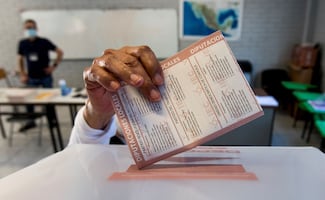Más Información

Trevilla narra operativo contra "El Mencho": pareja del capo fue clave; con voz cortada da pésame a familiares de compañeros fallecidos

Reportan que AICM opera con normalidad; van 58 vuelos cancelados y 11 demorados por violencia en Jalisco

Reforma electoral de Sheinbaum vuelve a atorarse por desacuerdo de PT y PVEM; iniciativa mantiene reducción de pluris y recorte presupuestal
The time has come after a long, bitter and controversial process started in 2016 which involved ceaseless negotiations, two extensions, three British prime ministers, and three general elections. Today the United Kingdom is officially out of the European Union , yet a new round of talks will be opened this year between both sides.
What comes after Brexit ?
Let’s start with the most pressing and obvious issue, the transition period established in the European Union Withdrawal Agreement approved by Britain’s Parliament on January 9, 2020, that sets out an 11-month time frame in which to discuss a wider partnership. And here the disagreements begin again: Brussels considers the period extremely tight, and has given the UK the option to ask for more time, while London insists there will be no delays, saying it must be free of EU rules as soon as possible.
Under the “ divorce deal ”, the European Commission , which is planning 10 negotiating tables for the huge task ahead including trade, security, transport, energy, fisheries, data, education, and research cooperation, kicked off its 30-stage process in agreeing its goals before Christmas and these are expected to be signed off by the 27 remaining EU members on February 25 , followed by a European Council meeting in March. Therefore, talks are unlikely to begin before that month.
A joint committee of EU and British representatives to oversee implementation of the deal can sit from tomorrow. However, there is little information regarding its functions or how often it will meet.
In preparation for the process, Brussels has warned that a no-deal or “ hard ” Brexit remained a risk for the next December 31 , stressing that border checks on goods will “become the norm” even if the UK achieves the no-tariff, no-quota agreement it seeks.
European Union’s chief Brexit negotiator
Michel Barnier
said that Britain’s departure from the bloc —the first in history, ending nearly 50 years of membership—would have “negative consequences”. During a visit to Northern Ireland on Monday, he added that “whatever agreement we reach in our future relationship, Brexit will always be a matter of damage limitation.”
Barnier declared earlier in Dublin , Ireland , that he would present a draft negotiating mandate to the EU members next Monday.
“If we have no agreement, it will not be business as usual and the status quo. We have to face a risk of a cliff edge, in particular for trade,” he remarked, saying that “ the UK has agreed to a system of reinforced checks and controls for goods entering Northern Ireland from Great Britain ,” despite comments from British Prime Minister Boris Johnson , who affirmed that the checks will not be needed.
In a joint press conference, Irish Prime Minister Leo Varadkar said for his part that the European Union will have the upper hand in trade talks with the UK , coinciding with Barnier in the comparative advantage the bloc has-9% of Europe’s trade is with Britain and 47% of British exports go to the European Union .
No piecemeal agreement
Varadkar also warned that Brussels will not accept a “ piecemeal ” trade deal in which London had rights without obligations. “That is not something that will fly in Europe ,” he added.
In a more conciliatory tone, Downing Street has indicated that it could accept a partial trade deal . Johnson will meet European Commission new President Ursula von der Leyen on Wednesday, after a series of comments from the former German Defense Minister highlighting that “the Brexit drama has already become a bitter lesson for all those populists who have fantasized about leaving the European Union .”
Johnson’s problem—or perhaps his ace under the sleeve—is the lack of information regarding his plans. He wants to negotiate a deal based on the 2014 EU-Canada Comprehensive Economic and Trade Agreement , yet at the same time seems eager to begin talks with the United States and other countries— India , Brazil , and Mexico are mentioned by the promoters of “ Global Britain ”—without the “level playing field” provisions that would tie the UK to EU rules in the future.
For starters, Johnson has reduced parliamentary scrutiny of the next phase. The House of Lords ( the upper house of Parliament) EU committee has invited yet failed to get the Brexit Secretary Stephen Barclay to appear to explain the next stages, although he told the BBC that the goals and red lines of the negotiations would be published.
Barclay’s department will close today, as part of a cabinet reshuffle expected in early February which would include the Treasury, the Department of International Trade, the Foreign Office, and other agencies, reported The Guardian . Michael Gove , a hard brexiteer , will continue to head a special Exiting the EU operation committee , known as XO , and is expected to have a key role in the new phase.
As Barnier and Von der Leyen have remarked, work must start urgently on the arrangements for Northern Ireland that will affect all trading on both sides; nonetheless, the EU and Britain’s revenue and customs office will have to wait until the shape of the eventual deal is known to design new border systems, possibly during the summer.
Another outstanding issue is the future of the three million British citizens living in the EU, who are deeply concerned that they are being “massively downgraded” and that they will be used by Brussels as leverage to exact concessions from the UK .
Activists have written to Barnier, arguing that their rights should be separated from trade talks. While the rights of British pensioners have been secured in the withdrawal agreement, they point out that 80% of British nationals in the EU are or working age or younger. After the transition period, they will all be restricted to working in the country in which they are currently resident.
It is worth remembering that Northern Ireland and Scotland voted in favor of remaining in the European Union during the historic 2016 referendum . If there are concerns about the stability of the first once border controls are imposed, possibly creating bottlenecks in trade and people’s mobility, in the latter the victory of the ruling Scottish National Party in the December 12 general elections has given new momentum to the independent aspirations.
Nevertheless, this month Johnson wrote to Scottish Prime Minister Nicola Sturgeon rejecting her request for the transfer of powers to the Holyrood parliament in Edinburgh , necessary to hold a second referendum —the first took place in 2014— on independence .
As Sturgeon, Johnson and his Conservative Party achieved a stunning victory in the general elections, installing the most right-wing government in post-war British history . In spite of the mounting uncertainty and the economic and political risks generated by the end of nearly 50 years of EU membership, as well as the austerity policies that have increased poverty and inequality, the Labour Party suffered its worst defeat since 1935.
In order to obtain this result, Johnson, the Tories, and the forces behind Brexit —a mix of right-wing populists, nationalists, and the neoliberal financial sector from The City of London—resorted since the 2016 referendum to a massive media manipulation which included the demonization of former Labour leader Jeremy Corbyn , who was also unable to articulate a viable alternative.
This time, however, the clock is ticking towards the real Brexit in 2021 and Johnson will have to deliver his promises of a brave new world and the restoration of past British splendor, in an environment dominated by the intensified competition between great powers.
Editing by Sofía Danis
More by Gabriel Moyssen
Noticias según tus intereses
[Publicidad]
[Publicidad]











